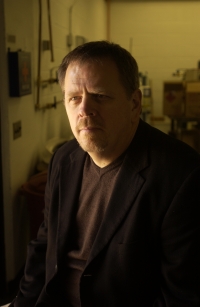Home > Press > Vanderbilt engineers play key role in new DOE energy frontier research
 |
Abstract:
A team of Vanderbilt engineers will play a key role in a new federal effort to significantly improve our understanding of how gases and liquids interact with solid surfaces - basic studies that have potential applications ranging from better batteries to more efficient methods for converting solar and electrical energy into fuel, improved fuel cells and enhancing the corrosion resistance of materials.
Vanderbilt engineers play key role in new DOE energy frontier research
Nashville, TN | Posted on April 30th, 2009That is the focus of a new multi-million-dollar Energy Frontier Research Center (EFRC) announced by the White House on April 27. The Fluid Interface Reactions, Structures and Transport (FIRST) Center is one of two such centers that the Department of Energy is establishing at Oak Ridge National Laboratory (ORNL) and one of 46 that it is setting up nationwide. Each of the centers will be supported with $2.5 million per year for five years.
"As global energy demand grows over this century, there is an urgent need to reduce our dependence on fossil fuels and imported oil and curtail greenhouse gas emissions," said Secretary of Energy Steven Chu when announcing the program. "Meeting this challenge will require significant scientific advances. These centers will mobilize the enormous talents and skills of our nation's scientific workforce in pursuit of the breakthroughs that are essential to make alternative and renewable energy truly viable as large-scale replacements for fossil fuels."
Peter Cummings, the John R. Hall Professor of Chemical Engineering at Vanderbilt, is a member of the FIRST leadership team. David J. Wesolowski from ORNL will direct the new center. Cummings will serve as a co-principal investigator along with David R. Cole, Sheng Dai and Steven Overbury from ORNL and will be overseeing the center's theory, modeling and simulation efforts.
"The EFRCs represent a very important investment in the basic research that will underpin new energy sources, energy storage methods and energy production techniques," Cummings said. "I am really excited about being part of this EFRC project. My group at Vanderbilt will be leading one of three research thrusts in the FIRST center, which is focused on the combined use of theory and experiment to understand the structures of different kinds of liquids at a number of different interfaces. The structure at these interfaces dramatically affects the performance of energy-relevant devices, such as advanced batteries and super-capacitors."
Other external participants are affiliated with the University of Tennessee, University of North Carolina, Argonne National Laboratory, Northwestern University, Drexel University and University of Virginia.
####
For more information, please click here
Contacts:
David F. Salisbury
(615) 322-NEWS
Copyright © Vanderbilt University
If you have a comment, please Contact us.Issuers of news releases, not 7th Wave, Inc. or Nanotechnology Now, are solely responsible for the accuracy of the content.
| Related News Press |
News and information
![]() Decoding hydrogen‑bond network of electrolyte for cryogenic durable aqueous zinc‑ion batteries January 30th, 2026
Decoding hydrogen‑bond network of electrolyte for cryogenic durable aqueous zinc‑ion batteries January 30th, 2026
![]() COF scaffold membrane with gate‑lane nanostructure for efficient Li+/Mg2+ separation January 30th, 2026
COF scaffold membrane with gate‑lane nanostructure for efficient Li+/Mg2+ separation January 30th, 2026
Govt.-Legislation/Regulation/Funding/Policy
![]() Metasurfaces smooth light to boost magnetic sensing precision January 30th, 2026
Metasurfaces smooth light to boost magnetic sensing precision January 30th, 2026
![]() New imaging approach transforms study of bacterial biofilms August 8th, 2025
New imaging approach transforms study of bacterial biofilms August 8th, 2025
![]() Electrifying results shed light on graphene foam as a potential material for lab grown cartilage June 6th, 2025
Electrifying results shed light on graphene foam as a potential material for lab grown cartilage June 6th, 2025
Academic/Education
![]() Rice University launches Rice Synthetic Biology Institute to improve lives January 12th, 2024
Rice University launches Rice Synthetic Biology Institute to improve lives January 12th, 2024
![]() Multi-institution, $4.6 million NSF grant to fund nanotechnology training September 9th, 2022
Multi-institution, $4.6 million NSF grant to fund nanotechnology training September 9th, 2022
Announcements
![]() Decoding hydrogen‑bond network of electrolyte for cryogenic durable aqueous zinc‑ion batteries January 30th, 2026
Decoding hydrogen‑bond network of electrolyte for cryogenic durable aqueous zinc‑ion batteries January 30th, 2026
![]() COF scaffold membrane with gate‑lane nanostructure for efficient Li+/Mg2+ separation January 30th, 2026
COF scaffold membrane with gate‑lane nanostructure for efficient Li+/Mg2+ separation January 30th, 2026
Energy
![]() Sensors innovations for smart lithium-based batteries: advancements, opportunities, and potential challenges August 8th, 2025
Sensors innovations for smart lithium-based batteries: advancements, opportunities, and potential challenges August 8th, 2025
![]() Simple algorithm paired with standard imaging tool could predict failure in lithium metal batteries August 8th, 2025
Simple algorithm paired with standard imaging tool could predict failure in lithium metal batteries August 8th, 2025
|
|
||
|
|
||
| The latest news from around the world, FREE | ||
|
|
||
|
|
||
| Premium Products | ||
|
|
||
|
Only the news you want to read!
Learn More |
||
|
|
||
|
Full-service, expert consulting
Learn More |
||
|
|
||








